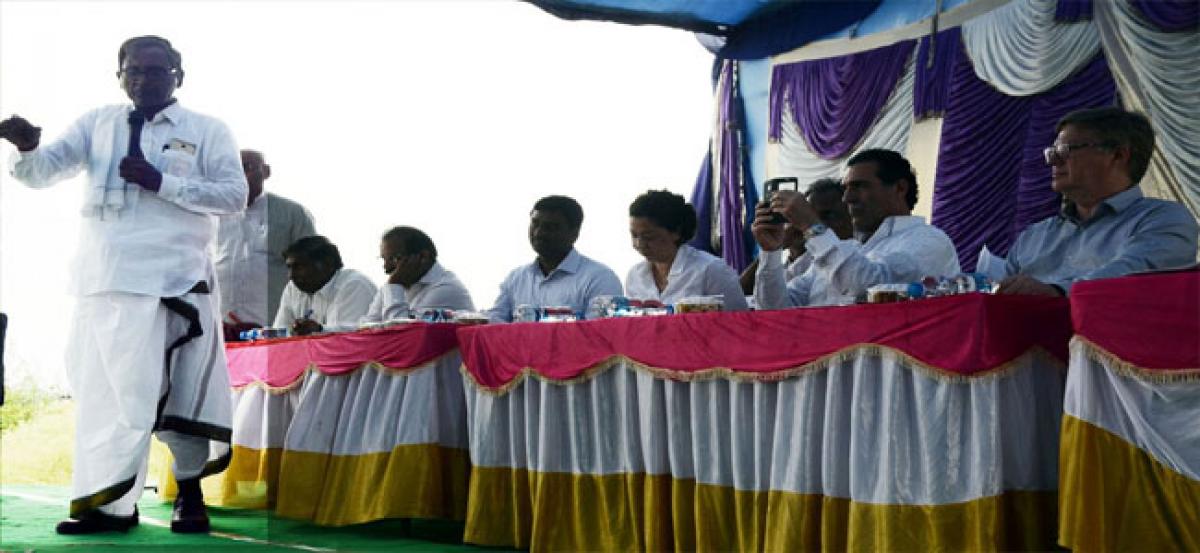Just In

Divergent views over funding by external agencies for capital building greeted the visiting 4-member Inspection Panel of the World Bank.Gonzalo Castro de la Mata, Inspection Panel Chairman, Jan Mattsson, Panel Member, Dilek Barlas, executive secretary, and Birgit Kuba,
Nelapadu (Amaravati): Divergent views over funding by external agencies for capital building greeted the visiting 4-member Inspection Panel of the World Bank.Gonzalo Castro de la Mata, Inspection Panel Chairman, Jan Mattsson, Panel Member, Dilek Barlas, executive secretary, and Birgit Kuba, Operations Officer, arrived in capital on Wednesday for a 3-day visit in a bid to give an outlet to the capital villagers in the wake of petitions raising objections over the World Bank’s move for a financial assistance of $3800 in US currency for infrastructure development in the capital region.
Even as the panel chose to be objective in hearing both the groups opposing and defending the aid, it devoted half of the first’s day’s visit to the farmers clamouring for WB aid at Nelapadu village under Thulluru mandal.
The Capital Region Development Authority (CRDA), a nodal government agency entrusted with the capital building, utilised the opportunity to mobilise the pro-capital farmers and let the official stand on the issue be heard by the team through the peasant representatives.
Dhanekula Rama Rao, Sudhakar and Narasimha Rao from Nelapadu, representing Amaravati Rajadhani Sameekarana Rytu Samakhya, countered the issues point-wise raised by the anti-capital petitioners with a request to the World Bank not to give credence to ‘fake complaints’.
Rama Rao said there is no flood threat to the capital in view of the Kondaveeti Vagu after the government initiated the Kondaveeti Vagu lift scheme for flood prevention. Therefore, the argument of the petitioners that it is not safe for location of capital in floodplains is meaningless, he contended.
Narasimha Rao said land pooling took place only after the consent of farmers and that there was no scope whatsoever for coercion from official agencies as alleged by anti-capital campaigners. “It is win-win for both the government and the farmers,” he said.
The next session gave the team members the other side of the picture. In a bid to let it be an independent mission, the team divided into two groups and visited Vundavilli and Penumaka and interacted with farmers without the company of official agencies.
People who interacted with the team in these villages complained that the government is going ahead with the capital project without conducting environment impact assessment and social impact assessment studies. Hence, funding for this project is against the established procedures, they asserted. The ecology of the illustrious Krishna river would be in jeopardy if the capital is allowed in the floodplains, they said.
The team will have similar interactions in Yarrabalem, Nidamarru, Uddandarayunipalem, Lingayapalem and Ananthavaram villages in the next two days of its visit. It may be recalled that the government has obtained an in-principle approval for Rs 7,000 crore from HUDCO and is approaching the other external aid agencies in China and UK for the capital project.
The fate of the capital hinges on the state government’s success in mobilising borrowings from the external agencies since the assistance coming from the Centre is quite adequate to meet the huge expenditure required for the project.
The government has succeeded in mobilising 95 per cent of land (29,000 out of 34,000) from farmers in a hassle-free manner. The farmers owning around 5,000 acres remaining outside the land pooling scheme are suspected to be behind the anti-capital crusade.
By G Nagaraja

© 2024 Hyderabad Media House Limited/The Hans India. All rights reserved. Powered by hocalwire.com







